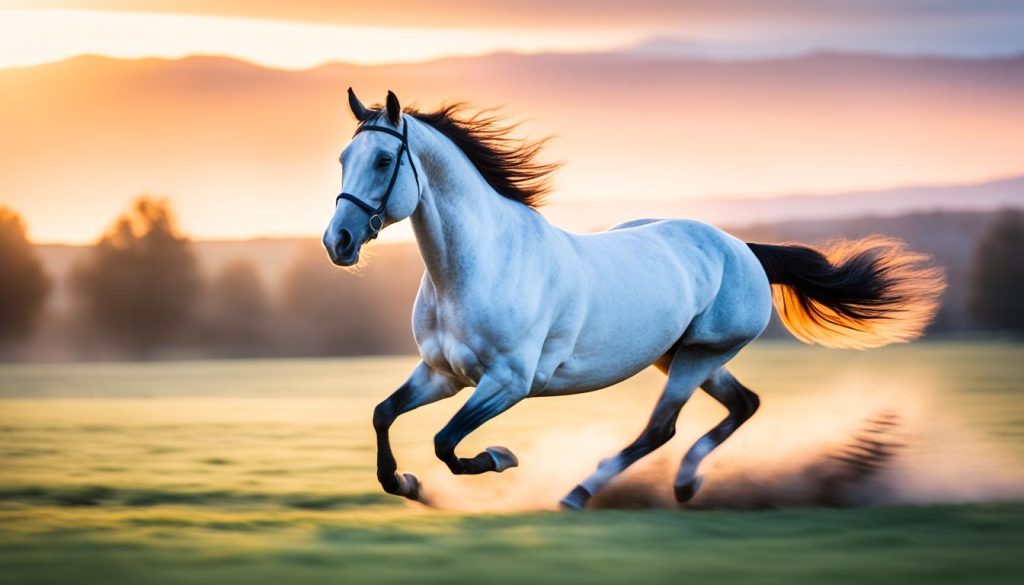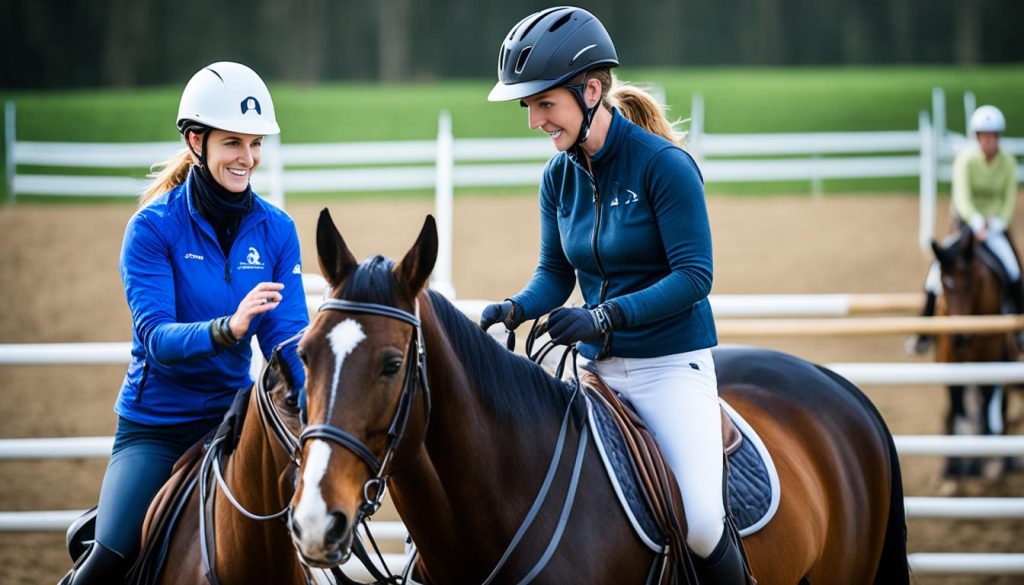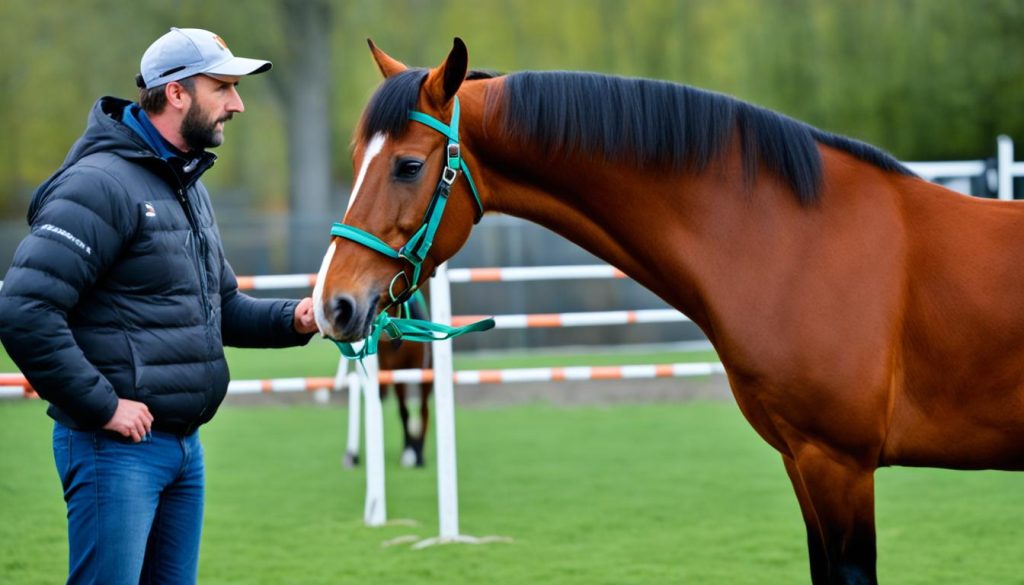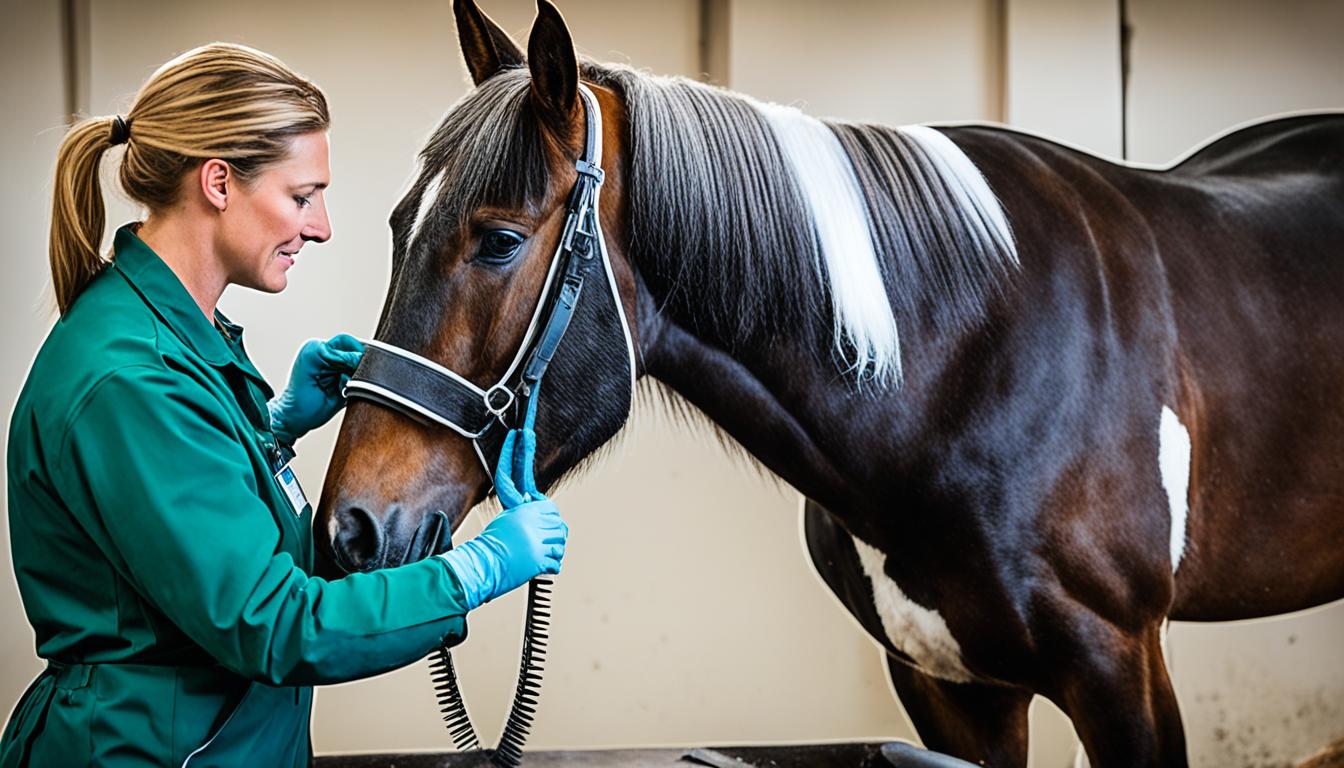Did you know that horse training can improve not only your horsemanship skills but also your overall relationship with these majestic creatures? Whether you dream of riding solo, competing in events, or simply bonding with your horse, starting your journey with the right foundations is essential. In this article, we will explore the essential horse training basics that every beginner needs to know, from choosing the right horse to teaching them manners and tricks. Get ready to embark on an extraordinary adventure!
Key Takeaways:
- Setting clear goals will help you stay focused and motivated throughout your horse training journey.
- It’s important to choose a horse that matches your experience level and needs to ensure a successful training experience.
- Working with an experienced trainer can provide valuable guidance and insights to help you avoid common training pitfalls.
- Teaching your horse basic ground manners is essential for their safety and the development of a productive relationship.
- Once your horse has mastered basic manners, you can introduce them to fun tricks to strengthen your bond and make training sessions more engaging.
Knowing Why You Want to Start Training Horses
Before embarking on your horse training journey, it is crucial to understand your motivations and goals. Setting clear horse training goals will not only provide direction but also help you tailor your training plan to achieve the desired outcomes. Whether your aspirations involve riding alone, competing in dressage events, or excelling in barrel racing, knowing your goals will shape your approach to training and keep you motivated.
Take some time to reflect on your ambitions and write down your horse training goals. Consider what you hope to achieve in the short term as well as in the long run. Prioritize your goals based on their importance to you and the timeline you have in mind. This will allow you to create a well-structured and achievable plan for your training journey.
Having a clear vision of your horse training goals will not only fuel your passion but also help you stay focused during the inevitable challenges that may arise along the way. Remember, every step you take towards your goals, no matter how small, is a step closer to realizing your dreams.

Visualizing your aspirations can be a powerful motivator, helping you maintain enthusiasm and dedication to your horse training journey. Keep your goals in mind and let them inspire and guide you as you embark on this exciting adventure.
Finding the Right Horse for You and Your Needs
When it comes to horse training, one of the most crucial decisions you’ll make is choosing the right horse for your needs and experience level. As an experienced equestrian, you may have the skills and confidence to handle a younger, more challenging horse. However, if you’re a beginner, it’s important to focus on finding a horse that matches your current skill level.
Trusting your instincts while making an educated choice is key. Take the time to assess your own abilities and goals in horse training. Are you looking for a horse to compete with in dressage events? Or perhaps you simply want a companion to ride alone on calm trail rides. Consider factors such as temperament, size, and level of training when evaluating potential horses.
Seeking advice from experienced riders and trainers can also be immensely helpful in your search. They have valuable insights and can offer guidance on what to look for in a horse. Don’t be afraid to ask for recommendations or seek out their expertise.
Remember, finding the right horse is crucial for a successful and enjoyable training journey. By considering your own experience level, trusting your instincts, and seeking advice from experienced riders and trainers, you can make an informed decision that sets you up for success.
Working with an Experienced Local Trainer
Collaborating with an experienced local trainer can greatly benefit your horse training journey. By working alongside a knowledgeable professional, you have the opportunity to learn from their direct experiences and gain valuable insights into horse behavior. This hands-on approach allows you to understand the intricacies of training and develop effective techniques that are tailored to your horse’s individual needs.
Horse training is a complex art that requires skill and finesse. Having a trainer by your side ensures that you receive expert guidance and avoid common training pitfalls. Rather than relying solely on books or online resources, working with a trainer allows you to tap into their wealth of knowledge and experience. They can provide personalized advice and suggestions that are specific to your training goals, helping you overcome challenges and achieve success.
Learning from direct experiences is a crucial part of your development as a horse trainer. By observing and participating in various training sessions with your trainer, you can witness the nuances of horse behavior and gain practical insights into training methodologies. This hands-on learning experience not only enhances your understanding but also fosters a deeper connection and bond with your horse.
“The best learning comes from doing. By working with a trainer, you have the opportunity to learn firsthand how to handle different situations and respond to your horse’s reactions. It’s a collaborative process that empowers you with the knowledge and skills to become a confident and effective trainer.” – Sarah Thompson, Experienced Trainer
Whether it’s refining your groundwork, perfecting your riding technique, or addressing specific behavioral issues, a trainer can guide you through each step of the training process. They can provide you with personalized training plans, monitor your progress, and make adjustments as needed. With their expertise and guidance, you can navigate the training journey with confidence and achieve your desired results.
An experienced local trainer not only offers professional guidance but also provides a supportive network within the equestrian community. They can connect you with other horse enthusiasts, share valuable resources, and recommend additional training opportunities. This network can be invaluable, as it provides a community of like-minded individuals who share a passion for horses and are dedicated to supporting each other’s growth.
Remember, working with a trainer is not just about achieving short-term training goals; it’s about building a solid foundation of knowledge and skills that will continue to benefit you throughout your horse training journey. By learning from direct experiences and avoiding common training pitfalls, you can become a skilled and confident trainer who forges a strong and harmonious partnership with your horse.
Working with an Experienced Trainer: Key Benefits
- Gaining insights into horse behavior and training techniques
- Receiving personalized advice and guidance tailored to your horse’s needs
- Learning from direct experiences and hands-on training sessions
- Developing practical skills for handling different situations
- Building a supportive network within the equestrian community

| Training Benefit | Explanation |
|---|---|
| Expert Guidance | Receive personalized advice and suggestions from a knowledgeable professional |
| Hands-On Learning | Observe and participate in training sessions to gain practical insights |
| Bond and Connection | Foster a deeper connection and bond with your horse through collaborative training |
| Targeted Training Plans | Receive personalized training plans to address specific goals and challenges |
| Equestrian Community | Access a supportive network of like-minded individuals within the horse community |
Teaching Your Horse Some Manners
Teaching your horse how to behave safely around you and others is crucial for a successful and productive relationship. By focusing on horse manners, you’ll ensure both horse safety and a positive experience for everyone involved. Horse safety should always be a top priority, and establishing good manners is a key component of achieving this.
Start by teaching your horse basic skills such as trailer loading and waiting patiently. These fundamental behaviors not only contribute to their safety but also make your interactions more convenient. If you encounter any bad behaviors in your horse, address them promptly. Correcting these issues early on prevents them from becoming more challenging to fix later.
“Horses have emotions, too. Building trust with your horse is essential for a harmonious partnership.”
Building trust is crucial for a strong bond with your horse. Horses are emotional animals and need to feel secure and comfortable with their handlers. Taking the time to teach them good manners fosters trust and strengthens your relationship. A trusting horse is more receptive to your training efforts and will ultimately make your sessions more productive and enjoyable.

Why are Horse Manners Important?
Horse manners play a vital role in creating a safe and respectful environment for both horses and humans. Here are a few reasons why teaching your horse good manners is essential:
- Promotes safety: Manners ensure that your horse won’t engage in behaviors that could potentially harm themselves or others.
- Enhances handling: Well-mannered horses are easier to handle, groom, and tack up, making your tasks more efficient.
- Improves rideability: A horse with good manners is more enjoyable to ride as they respond to your cues more effectively.
- Facilitates social interactions: Whether you’re riding with a group or attending events, a well-mannered horse is a pleasure to be around.
Remember, teaching your horse good manners is an ongoing process that requires consistency and patience. With dedication and persistence, you’ll establish a solid foundation for a harmonious partnership.
Starting to Train Your Horse on Tricks
Once your horse has mastered basic ground manners, you can start introducing them to fun tricks. From giving hugs to neck reining, teaching your horse new skills can be both enjoyable and rewarding. Horse tricks not only add excitement to your training sessions but also strengthen the bond between you and your horse.
When training your horse on tricks, it’s essential to approach the process with patience and consistency. Each trick should be taught step by step, using positive reinforcement and clear communication. Remember, horses thrive on positive interactions, so be sure to reward their efforts with treats, praise, or a gentle pat.
Start with simple tricks that build on your horse’s existing ground manners. For example, teaching your horse to give a hug involves guiding their head towards your chest when asked. This trick not only showcases their trust in you but also demonstrates their willingness to perform tasks on command.
As you progress, you can introduce more advanced tricks, such as neck reining. This skill is particularly useful for riders, as it enables you to guide your horse with a light touch on the neck instead of relying solely on the reins. Practice this trick in a controlled environment where your horse feels safe and relaxed.
“Training your horse on tricks can enhance your bond and make your training sessions more engaging.”
Training your horse on tricks allows you to have fun while reinforcing their ground manners. It’s important to remember that the process should always prioritize your horse’s safety and well-being. Stay consistent with your training sessions, dedicating regular time and attention to your horse’s progress.
By integrating tricks into your horse’s training routine, you can create a dynamic and enjoyable experience for both you and your horse. Remember to celebrate their achievements along the way, as learning new tricks is an exciting milestone in your journey together.
Benefits of Training Your Horse on Tricks:
- Enhances the bond between you and your horse
- Strengthens your horse’s ground manners
- Increases their responsiveness to commands
- Provides mental stimulation for your horse
- Adds variety and enjoyment to your training sessions
Understanding the Basics of Horse Training
Horse training is a multifaceted process that encompasses various principles applicable to all training methods. By understanding and implementing these fundamental concepts, you can establish a strong foundation with your horse and ensure effective training.
Establishing Leadership
To gain your horse’s respect and cooperation, it is crucial to establish yourself as the leader. Horses are herd animals and naturally seek a confident and assertive leader. By exhibiting consistent and confident behavior, you establish trust and create a harmonious training environment.
Patience
Patience is an essential trait to have when training horses. Each horse learns at its own pace, and it takes time for them to understand and execute new skills. Be patient when introducing new exercises or correcting undesirable behaviors. By allowing sufficient time for your horse to comprehend and adjust, you create a positive learning experience for both of you.
Consistency in Communication
Consistent communication is vital for effective horse training. Horses respond well to clear and consistent verbal commands, as well as body language cues. Consistency ensures that your horse understands and can distinguish between different commands and signals, making the training process smoother and more efficient.
Repetition for Reinforcement
Repetition plays a crucial role in solidifying new behaviors and habits. By consistently practicing and reinforcing desired actions, you reinforce the learning process and help your horse understand and remember what is expected of them. Repetition also helps build muscle memory, which contributes to the development of advanced skills and maneuvers.
By applying these foundational principles of horse training, you can establish a productive and respectful relationship with your horse. Remember that training takes time and dedication, so be patient and consistent in your approach. With practice, you will develop a strong bond and achieve your training goals.
Establishing yourself as the leader is important to gain your horse’s respect.
Conclusion
Horse training is a journey that requires dedication and patience, but it can be a rewarding experience for beginners. By setting clear goals, choosing the right horse, working with experienced trainers, and teaching your horse basic manners and tricks, you can develop a solid foundation in horsemanship. Remember to approach training with patience, consistency, and a positive mindset.
If you’re looking for further guidance in your horse training journey, there are various resources available to help you expand your knowledge and skills. Books, videos, and online courses are valuable tools that can provide beginner training tips, horse training timelines, and additional support. These resources can enhance your understanding and offer different perspectives on effective training techniques.
As you embark on your horse training adventure, always remember that progress takes time. Be patient with yourself and your horse, and celebrate each small milestone. By following these tips and utilizing the available resources, you’ll be well on your way to becoming a confident and skilled horse trainer.
